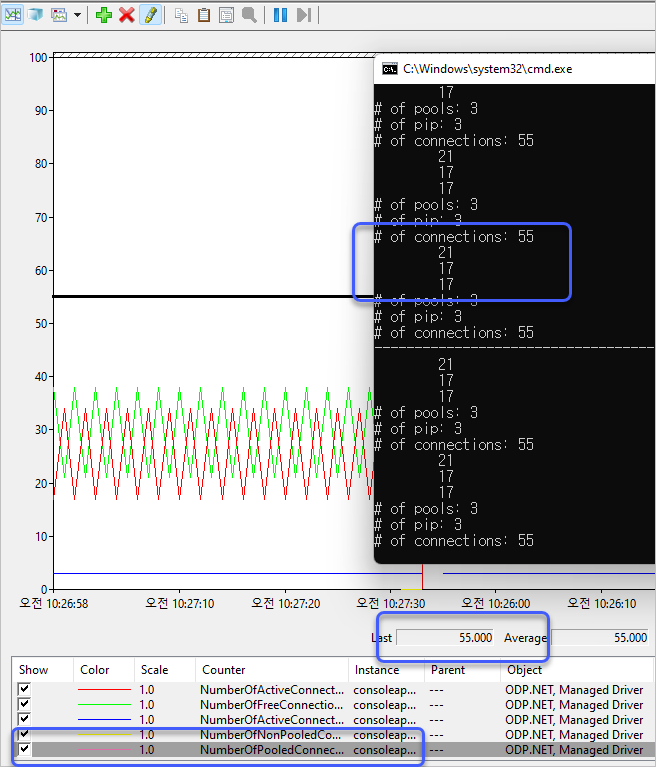C# - Oracle.ManagedDataAccess의 Pool 및 그것의 연결 개체 수를 알아내는 방법
이것을 알아내는 방법은, 공식적으로는 성능 카운터를 이용하는 방법이 있습니다.
C# - (.NET Framework를 위한) Oracle.ManagedDataAccess 패키지의 성능 카운터 설정 방법
; https://www.sysnet.pe.kr/2/0/13003
C# - Oracle.ManagedDataAccess.Core의 성능 카운터 설정 방법
; https://www.sysnet.pe.kr/2/0/13000
하지만, 아쉽게도 좀 번거롭다는 단점이 있습니다. 그냥 저런 설정 없이 알아낼 수 있다면 좋을 텐데요, 다행히 리플렉션을 이용하면 그런대로 원하는 목적을 이룰 수 있습니다.
그럼, 어디서 시작해볼까요? ^^
우선, OracleConnection.ClearAllPools 메서드가 있는데요,
public static void ClearAllPools()
{
// ...[생략]...
OracleConnectionDispenser<OraclePoolManager, OraclePool, OracleConnectionImpl>.ClearAllPools();
// ...[생략]...
}
여기서 다시 OracleConnectionDispenser`3.ClearAllPools를 들어가면,
internal static void ClearAllPools()
{
// ...[생략]...
List<PM> list = OracleConnectionDispenser<PM, CP, PR>.m_listPM.GetList();
for (int index = 0; index < list.Count; ++index)
list[index].ClearAllPools(default (PR), false);
}
// ...[생략]...
}
OracleConnectionDispenser`3 제네릭 클래스의 m_listPM 정적 필드에 Pool 개체들이 담겨 있음을 짐작게 합니다. 해당 제네릭 타입은 3개의 타입 인자를 받아들이므로,
OracleConnectionDispenser<OraclePoolManager, OraclePool, OracleConnectionImpl>
이전에 설명한 방법을 사용해 일단 이렇게 m_listPM 목록을 구할 수 있습니다.
using Oracle.ManagedDataAccess.Client;
using System;
using System.Collections.Generic;
using System.Linq;
using System.Reflection;
internal class Program
{
static void Main(string[] args)
{
Assembly asm = typeof(OracleConnection).Assembly;
Dictionary<string, Type> typeArgs = new Dictionary<string, Type>()
{
["OracleInternal.ConnectionPool.OraclePoolManager"] = null,
["OracleInternal.ConnectionPool.OraclePool"] = null,
["OracleInternal.ServiceObjects.OracleConnectionImpl"] = null,
};
Type poolType = null;
foreach (Type type in asm.GetTypes())
{
string name = type.FullName;
if (typeArgs.ContainsKey(type.FullName) == true)
{
typeArgs[type.FullName] = type;
continue;
}
if (name.IndexOf("OracleConnectionDispenser") == -1)
{
continue;
}
poolType = type;
}
bool resolvedAll = typeArgs.All((e) => e.Value != null);
if (resolvedAll == false)
{
return;
}
Type[] genericArgs = new Type[]
{
typeArgs["OracleInternal.ConnectionPool.OraclePoolManager"],
typeArgs["OracleInternal.ConnectionPool.OraclePool"],
typeArgs["OracleInternal.ServiceObjects.OracleConnectionImpl"]
};
Type poolGenericType = poolType.MakeGenericType(genericArgs);
{
FieldInfo fi = poolGenericType.GetField("m_listPM", BindingFlags.Static | BindingFlags.Public);
object syncQList = fi.GetValue(null);
Console.WriteLine(syncQList);
}
}
}
그다음, syncQList에는 개체 풀을 유지하는 목록이 들어 있을 텐데요, 해당 타입을 보면,
using System.Collections.Generic;
namespace OracleInternal.Common
{
internal class SyncQueueList<T>
{
internal List<T> m_list;
internal object m_sync;
internal int m_max;
internal bool m_bMaxExplicitlySet;
// ...[생략]...
}
}
다시 내부의 리스트로 보관하고 있습니다. 어쩔 수 없이 그 필드를 구하는,
{
FieldInfo fi = poolGenericType.GetField("m_listPM", BindingFlags.Static | BindingFlags.Public);
object syncQList = fi.GetValue(null);
object poolList = GetInstanceFieldValue(syncQList, "m_list", BindingFlags.NonPublic | BindingFlags.Instance);
int numberOfPool = 0;
foreach (var pool in poolList as IEnumerable)
{
numberOfPool++;
}
Console.WriteLine(numberOfPool);
}
private static object GetInstanceFieldValue(object objInstance, string fieldName, BindingFlags flags)
{
return objInstance.GetType().GetField(fieldName, flags).GetValue(objInstance);
}
위의 코드를 실행하면, 현재 풀이 만들어진 적이 없으므로 numberOfPool 값은 0이 나옵니다. 이 상태에서 다음의 예제 코드를 한번 실행시켜 두면,
string oradb = "Data Source=(DESCRIPTION=(ADDRESS=(PROTOCOL=TCP)(HOST=127.0.0.1)(PORT=1521))(CONNECT_DATA=(SERVICE_NAME=XE)));User Id=hr;Password=hr2;";
DoOracleManagedCall(oradb, 0);
protected static void DoOracleManagedCall(string oradb, int delay)
{
using (OracleConnection oraConnection = new OracleConnection(oradb))
{
oraConnection.Open();
if (delay > 0)
{
Thread.Sleep(delay);
}
}
}
이제 리플렉션 코드는 numberOfPool의 개수로 1을 반환합니다.
자, 그럼 저 m_list는 OraclePoolManager의 목록을 가지고 있게 되는데요, (OraclePoolManager가 상속받은) PoolManager.ClearAllPools의 메서드를 보면,
public virtual void ClearAllPools(PR pr, bool isHAEvnt = false)
{
// ...[생략]...
List<CP> list = this.m_pmListCP.GetList();
for (int index = 0; index < list.Count; ++index)
list[index].ClearPool(pr, isHAEvnt);
}
// ...[생략]...
}
System.Collections.Generic.List`1[OracleInternal.ConnectionPool.OraclePoolManager] m_list
다시, 내부에서 구성한 List를 열거하면서 ClearPool 메서드를 호출하고 있습니다. 여기서 잘 이해가 안 됩니다. 일반적으로 다중 Pool이 제공되고 각각의 Pool에서 다시 연결 개체를 소유하는 것으로 알고 있었는데, Pool 목록에서 다시 개별 요소들이 Pool을 가지고 있는 유형으로 나옵니다.
어쨌든, m_pmListCP도 SyncQueueList`1 타입이므로 최종적으로 다음과 같이 열거할 수 있습니다.
// ...[생략]...
int numberOfPool = 0;
foreach (var pool in poolList as IEnumerable)
{
numberOfPool++;
object pmListCP = GetInstanceFieldValue(pool, "m_pmListCP", BindingFlags.Public | BindingFlags.Instance);
object pmListCPList = GetInstanceFieldValue(pmListCP, "m_list", BindingFlags.NonPublic | BindingFlags.Instance);
foreach (var pmCP in pmListCPList as IEnumerable)
{
Console.WriteLine(pmCP); // OracleInternal.ConnectionPool.OraclePool
}
}
Console.WriteLine(numberOfPool);
ClearAllPools 메서드에서는 결국 저렇게 얻은 OracleInternal.ConnectionPool.OraclePool 개체의 ClearPool 메서드를 호출하는 건데요,
public void ClearPool(PR prToRetain, bool isHAEvnt = false)
{
// ...[생략]...
List<PR> list = this.m_cpListPR.GetList();
for (int index = 0; index < list.Count; ++index)
{
// ...[생략]...
PR pr = list[index];
if ((object) pr != null)
{
// ...[생략]...
pr.m_pm.Close(pr, (OracleConnection) null);
// ...[생략]...
}
// ...[생략]...
}
// ...[생략]...
}
보는 바와 같이 m_cpListPR이라는 목록을 연결 개체가 보관하는 듯하고, Close 메서드를 호출함으로써 연결을 정리하고 있습니다. 그래서 대략 다음과 같은 식으로 코드를 완성할 수 있습니다.
int numberOfPool = 0;
int numberOfCount = 0;
foreach (var pool in poolList as IEnumerable)
{
numberOfPool++;
object pmListCP = GetInstanceFieldValue(pool, "m_pmListCP", BindingFlags.Public | BindingFlags.Instance);
object pmListCPList = GetInstanceFieldValue(pmListCP, "m_list", BindingFlags.NonPublic | BindingFlags.Instance);
foreach (var pmCP in pmListCPList as IEnumerable)
{
// OracleInternal.Common.SyncQueueList`1[OracleInternal.ServiceObjects.OracleConnectionImpl]
object cpListPR = GetInstanceFieldValue(pmCP, "m_cpListPR", BindingFlags.Public | BindingFlags.Instance);
object cpListPRList = GetInstanceFieldValue(cpListPR, "m_list", BindingFlags.NonPublic | BindingFlags.Instance);
int cpListSize = (int)GetInstanceFieldValue(cpListPRList, "_size", BindingFlags.NonPublic | BindingFlags.Instance);
numberOfCount += cpListSize;
}
}
Console.WriteLine($"# of pools: {numberOfPool}");
Console.WriteLine($"# of connections: {numberOfCount}");
실제로 저 코드를 WriteCount라는 메서드로 분리해서 다음과 같이 실행해 보면,
string oradb1 = "Data Source=(DESCRIPTION=(ADDRESS=(PROTOCOL=TCP)(HOST=127.0.0.1)(PORT=1521))(CONNECT_DATA=(SERVICE_NAME=XE)));User Id=hr;Password=hr2;Min Pool Size=15;";
string oradb2 = "Data Source=(DESCRIPTION=(ADDRESS=(PROTOCOL=TCP)(HOST=127.0.0.1)(PORT=1521))(CONNECT_DATA=(SERVICE_NAME=XE)));User Id=hr;Password=hr2;Min Pool Size=10;";
string oradb3 = "Data Source=(DESCRIPTION=(ADDRESS=(PROTOCOL=TCP)(HOST=127.0.0.1)(PORT=1521))(CONNECT_DATA=(SERVICE_NAME=XE)));User Id=hr;Password=hr2;";
do
{
Type poolGenericType = poolType.MakeGenericType(genericArgs);
WriteCount(poolGenericType);
for (int i = 0; i < 17; i++)
{
DoOracleManagedCall(oradb1, 1000);
}
WriteCount(poolGenericType);
Thread.Sleep(1000);
for (int i = 0; i < 17; i++)
{
DoOracleManagedCall(oradb2, 1000);
}
WriteCount(poolGenericType);
Thread.Sleep(1000);
for (int i = 0; i < 17; i++)
{
DoOracleManagedCall(oradb3, 1000);
}
WriteCount(poolGenericType);
Console.WriteLine("---------------------------------------------------------------");
} while (true);
서로 다른 연결 개체를 3개 사용했으므로, 3개의 연결 개체 풀이 생성될 것이고, 각각의 풀에는 17개의 연결 개체가 들어 있을 것입니다. 운이 좋은 경우 정확히 3 * 17 = 51개가 나오는 경우도 있지만, 대개의 경우 풀 내부의 정책으로 더 있을 수 있습니다.
실제로 이를 성능 모니터링 도구와 함께 확인해 보면 다음과 같이 나옵니다.

보시면, 3개의 풀이 있고, 각각의 풀에는 21개, 17개, 17개까지 총 55개의 연결 개체가 생성돼 있는 것을 볼 수 있습니다. 그리고 그 값은 정확하게 성능 모니터링 도구의 "NumberOfPooledConnections" 수와 일치합니다.
(
첨부 파일은 이 글의 예제 코드를 포함합니다.)
[이 글에 대해서 여러분들과 의견을 공유하고 싶습니다. 틀리거나 미흡한 부분 또는 의문 사항이 있으시면 언제든 댓글 남겨주십시오.]